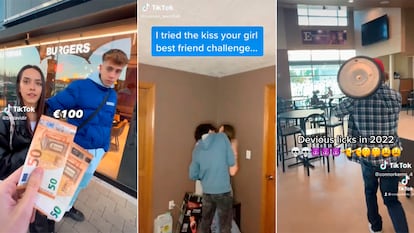How viral videos shape what teens think about relationships
Experts warns that TikTok challenges teach teenagers unhealthy ideas about romance, and must be countered by setting a strong example

No platform can make a video viral quite like TikTok. Users do not need lots of followers for their content to reach millions of views. Even if a person has few followers, their video can end up being recommended to countless people. What’s more, what tends to go quickly viral are TikTok challenges, which are often dangerous: the Blue Whale Challenge, for example, required users to commit suicide. Even supposedly humorous challenges, have a negative undertone. According to Arola Poch, a psychologist, sexologist and expert in sexual education for youth, this is also true of the Kiss Your Best Friend challenge.
The videos people make for this challenge, which has been around for almost a year and is still viral, try to be funny: someone is at home with their best friend and, suddenly, without the other person expecting it, tries to kiss them on the mouth. The reactions are wide-ranging: some accept it and let the situation become the start of something else, while others push them aside. In some videos, the two friends laugh about the whole thing, whether the kiss was accepted or not, but in others there is evident anger. “Some may think it’s silly, but it is not, because it disregards the consent that all relationships must have, as well as the values of a proper sexual education. The undertone of these kinds of behavior, which can come across as funny in a video, is not correct,” warns the sexologist.
@carsonwestfall It’s my bestfriends girlfriend.. #BeatsDaisyChallenge #FashionEdit #VibeZone #fyp #viral #xyzbca #foryoupage
♬ original sound - Carson Westfall
According to the Nationwide Children’s Hospital, in Ohio, with this challenge, “many teens do not understand that forced kissing is a form of sexual violence. Follow up videos included teens who said they felt confused, uncomfortable and violated by the nonconsensual kissing.”
For Luis de la Herrán, a specialist in clinical psychology, “if a 12-year-old watches a video of this kind and knows that the adults they look up to take relationships seriously, that there are limits that they cannot cross and there is trust, intimacy and so on, something will seem strange, even if they are nine, they will think ‘this is not right’ and they won’t do it. They will filter it out, because they had a prior learning model.”
The learning model and the values that a teenager acquires at home and at school are essential for how they interpret what they see on social media. As the psychologist explains, the cerebral cortex, which deals with critical thinking and planning, is the last part to mature in teenagers, which makes this control and guidance more necessary. “The key is how we prepare teens to be able to face this content. It’s like the rain: if you wear summer clothes to go out in the middle of a storm, you are going to get wet. If the rain represents something negative, it will be harmful to you. If they taught us to wear boots, a raincoat and an umbrella, we will be better protected,” he explains.
The Nationwide Children’s Hospital also analyzed a challenge called “Iknowsomethingyoudont” where users joked about secrets, including some about relationships, or referring to people stalking their partners on social media to gather information about their previous relationships. Another one, called #deviouslicks, caused numerous acts of vandalism in American schools, and also included dares like kissing a friend’s girlfriend, exposing genitals and touching a woman’s breasts. In this case, TikTok took action and those videos can no longer be found.
One of the measures that TikTok has implemented is known as Family Pairing, which allows parents to link their account with that of their children. Parents can decide what their child can search for, manage the privacy of their account, block private messages from strangers and activate the Restricted Mode, so that videos that may not be suitable are not recommended to them.
According to TikTok rules, if teens between 13 (the minimum age to use the app) and 18 years old enter their real age when creating a new account, they will not be able to search some keywords, such as “sex,” “sexy” or “naked.” The problem lies in whether or not that teenager was honest about their true age, as nothing stops them from simply entering a different date of birth. It all depends on their own will, as well as the supervision of their parents or guardians.
@bydavidir Retos de pareja!😱#millonario #pareja #feliz
♬ sonido original - Bydavidir
Even so, and with all the measures available, teenagers can find many videos with negative undertones that do not violate the platform’s community guidelines. The content does not have to be explicit, experts insist, to be sexist.
“I absolutely believe that teenagers can reason, that if a boy or a girl are raised with values like empathy, respect and equality, they will not forget them suddenly by watching a video, and they will be able to understand what suits them and what doesn’t. Of course, that doesn’t mean that some people won’t fall for such popular and viral content, because at that moment of life the power of peers is important, as well as feeling accepted and the popularity that social media provides,” explains Poch.
According to Luis de la Herrán, that feeling of belonging brings peace to teenagers. “Surprisingly, at this point we find many sexist behaviors, which are apparently normalized at very early ages. I believe that the contribution that we can make from psychology is to ask: what are we adults doing about that?”
If a teenager spends many hours on TikTok or online, parents must try to counter that by setting a strong example, says De la Herrán. Without instilling proper values, “there is a greater chance of them thinking that [the negative behaviors on TikTok] are normal,” explains the psychologist. By way of example, he says that if a teenage girl is asked by her boyfriend to hand over her phone or to block other boys on social media, she may consider such behavior normal if she has not been taught other values.
That is precisely the kind of content that can be seen a lot on TikTok: the reactions of jealous boyfriends and challenges to test whether a partner has been unfaithful. Some may treat the subject with humor, but in many cases, the reactions are real.
“Those videos of jealous reactions are seen as proof of love,” laments Arola Poch. “I think that this happens more on TikTok because the average age is a bit lower, it is easier for videos to go viral and these kinds of videos and challenges become widespread.”
Sign up for our weekly newsletter to get more English-language news coverage from EL PAÍS USA Edition
Tu suscripción se está usando en otro dispositivo
¿Quieres añadir otro usuario a tu suscripción?
Si continúas leyendo en este dispositivo, no se podrá leer en el otro.
FlechaTu suscripción se está usando en otro dispositivo y solo puedes acceder a EL PAÍS desde un dispositivo a la vez.
Si quieres compartir tu cuenta, cambia tu suscripción a la modalidad Premium, así podrás añadir otro usuario. Cada uno accederá con su propia cuenta de email, lo que os permitirá personalizar vuestra experiencia en EL PAÍS.
¿Tienes una suscripción de empresa? Accede aquí para contratar más cuentas.
En el caso de no saber quién está usando tu cuenta, te recomendamos cambiar tu contraseña aquí.
Si decides continuar compartiendo tu cuenta, este mensaje se mostrará en tu dispositivo y en el de la otra persona que está usando tu cuenta de forma indefinida, afectando a tu experiencia de lectura. Puedes consultar aquí los términos y condiciones de la suscripción digital.









































